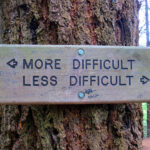Today, when we face problems or disagreements, we have to arrive at solutions through dialogue. – Dalai Lama
What does that mean?
This is a variation of “violence begets more violence” but is stated from the opposite direction. He is calling for dialogue, or discussion, as the peaceful path to the resolution of our differences. I presume that dialog will also be proper tomorrow. 8)
By using words instead of bullets and bombs, we can still disagree, but hopefully end up with fewer casualties. Also, if we listen as well as talk, we can learn what is important to the other side. We can also work on solidifying the common ground, and try to move closer together in the areas of contention.
Why is dialog important?
Unless you are psychic, you will need some method of communication to find out what the other person is thinking, and what their positions might be. By talking (and, by extension, listening), you can get a better exchange of ideas. You won’t necessarily agree, but it’s a start.
Think for a moment about this: Language exists to facilitate the moving of ideas from one person to another. If you don’t talk to them, and don’t listen to them when they talk, how will you get your ideas to them, and they get their ideas to you?
Dialog by definition goes both ways. How many arguments are arguments for the simple reason that one or both parties are ignoring the wants and needs of the other? I know I’ve done that once or twice. How about you, does dialog work better for you or do ultimatums work better?
Where can I apply this in my life?
As the parent of a teen, this is a bit of an adjustment for me. I’m used to being the dad, and what I say goes. Now I’m getting a little push back. Not uncommon, given the age. I’m just having to adjust my thinking to take into account the needs and desires of someone else.
I already do this with my wife, but now there’s a third person of whom I must keep track. That doesn’t mean that they are right any more than before, but I now acknowledge that they deserve an explanation, so that they might understand why, even if they don’t agree with the answer.
But problems and disagreements aren’t just for parents of teens. Some relationships are a little less dialog and a little more dictatorial. Then there’s work and all your friends and social contacts. And have you ever tried to de-escalate a situation between some people? Fun, right?
Dialog is useful in so many situations. Any time I feel myself starting to become angry, I try to immediately calm myself and turn to dialog. Most of the time I find that I am either misunderstanding someone elses’ motivations, or they are doing something that seems natural to them, but is annoying to me.
When could you use a little more dialog? I would recommend that you try something like I have, where you try to wire both calm and dialog into your anger, frustration, or confrontation reaction. That way, as you start to leave the path of peaceful resolution, you can apply the brakes and begin dialog before you get a chance to do something less than spectacularly skillful. Does that make sense?
Take a moment, and some paper, and write down the last few arguments, problems, confrontations or other disagreements that you were in. Leave some space between each for additional work, please.
Now take a moment and reflect on each of the instances, one at a time. For each, you should know exactly what you were thinking, and why you know that you were right. So instead, fill the space you left with the reasons the other person(s) had for believing they were right. Add what they objected to in your position. Then finish with what they were ultimately trying to accomplish.
Once you have completed this for all your instances, take a moment and go over each one. How many of the ‘facts’ you have written are actually what they said, and how many were what you inferred from prior encounters, personal bias or other hallucinations you might have been having. Put a thin line through each that was not specifically stated by the other party.
How much is left? If you’re like me, there isn’t much left. Since we aren’t psychic (at least I’m not), I can sometimes misunderstand the simplest of statements. That’s why I used the word ‘hallucinations’ in the paragraph above. You may have heard, but did you understand correctly, or did you hallucinate?
One technique to help with hallucinations is to repeat back to the other person(s) what you think they just said, but using your own words. This form of confirmation may slow the conversation down a little bit, but if you aren’t understanding what they’re saying, you’re just rushing over a cliff, right?
Life is short, too short for misunderstandings. Talk things out, get it right, understand what they are saying, then work on what you can agree on. Then work on achieving a better understanding about why you disagree on the aspects that remain. If you keep asking the probing questions, you may eventually be able to help them find a better solution, one you can all agree on.
From: Twitter, @DalaiLama
confirmed at : it’s his own feed…
Photo by US Mission Geneva








There are some attention-grabbing points in time on this article but I don’t know if I see all of them heart to heart. There’s some validity but I will take maintain opinion until I look into it further. Good article , thanks and I want more! Added to FeedBurner as nicely.
Pingback: Anger cannot be overcome by anger. If a person shows anger to you, and you show anger in return, the result is a disaster. | philosiblog